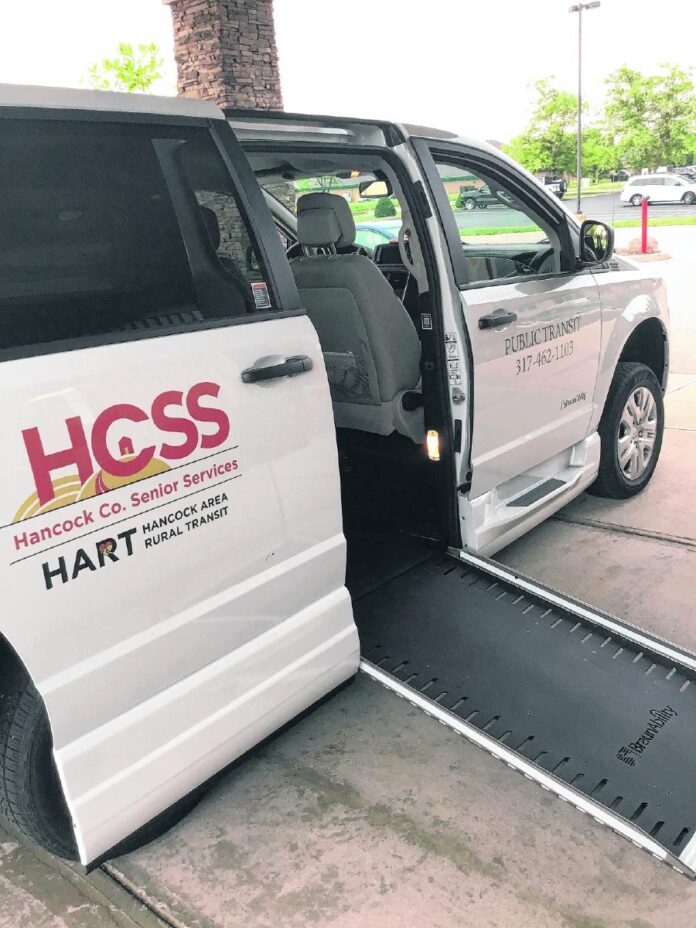
GREENFIELD — The funding future of Hancock Area Rural Transit remains uncertain as county officials continue to look for a way to maintain local control of finances for the county’s public transportation program. County officials have proposed the idea of independently funding the service, at least for a limited time, rather than partnering with the Indianapolis transportation entity IndyGo.
HART, which is operated by Hancock County Senior Services, runs five days a week. Transportation is available for free for senior citizens and for a small cost to anyone else in the county. Many seniors use the service to get to medical appointments, to do grocery shopping and for other essential trips.
Until now, state transit funding for Senior Services has been overseen by the county. But with a change the Indiana Department of Transportation is making, that will no longer be the case. Instead, the funding will flow through IndyGo, the Indianapolis-area offshoot of the Central Indiana Regional Transportation Authority.
That’s exactly what Hancock County officials didn’t want to happen, Hancock County Commissioner John Jessup said
County council member Bill Bolander said he believes the county government should, if possible, avoid entering into any arrangement with IndyGo, which operates 31 bus routes with more than 3,000 bus stops in Marion County.
“We really don’t want to go with IndyGo if we can help it,” Bolander said.
However, he said, the county has a limited ability to self-fund an endeavor like HART.
HART is currently funded by both state and federal grants, with the county providing matching funds. It also receives money from Medicaid, CICOA Aging & In-Home Solutions, United Way and private donations.
Bolander and other county officials said they are concerned that if Hancock County enters into a relationship with IndyGo, dollars that should go toward HART and Senior Services transportation will end up being redirected to Indianapolis transportation instead. At a recent joint meeting, members of the county council and county commissioners expressed worries that IndyGo’s oversight would be less efficient.
Jessup proposed the idea of self-funding HART with money the county has received from the CARES Act, a federal program intended to reimburse governments for expenses accrued due to the COVID-19 pandemic. However, that money must be used by 2024, so there would not be an obvious path for the county to continue funding the program after that.
Jessup estimated that without federal funding, it would cost about $375,000 annually for the county to make up the funding difference. He also suggested it would be possible for a private entity, separate from Senior Services, to fund the services as a non-profit.
The officials planned to discuss the matter with a representative from INDOT at their meeting today (Tuesday, March 30).
“I let IndyGo know that we weren’t real thrilled about the situation, but we would have the conversation and try to go into it with an open mind,” Jessup said.
Lesley Gordon, vice president of marketing and communications for IndyGo, said in an email that the change will mean a pot of federal money for urban transit that was previously shared by two entities (IndyGo and the Central Indiana Regional Transportation Authority) will now be shared by six organizations. Going forward, she said, a funding formula will be used to distribute dollars that aims to preserve as much funding as possible for each entity.
“There may be some changes as a result of the transition but the (HART) service should largely appear to be the same,” Gordon said. “We’ve been in conversations with the current service provider about the transition and the next steps.”
Gordon said IndyGo is committed to assisting the “donut” counties with the transportation transition. Hendricks, Hamilton and Johnson counties also are part of the funding change.
“The service HART provides in Hancock County is great, and we are not interested in absorbing HART,” she said. “We are interested in ensuring that Hancock County continues to receive the public transportation the community desires and in providing key critical regional transfer points for those wishing to connect into Marion County.”
Suzanne Derengowski, executive director of Senior Services, said she does not have a strong preference about how the funding is handled going forward and is waiting to receive more information on how the county wants to proceed.
The change in the funding mechanism follows a move by INDOT to reclassify Hancock and the other counties as urban transit districts, rather than rural ones. The change is based on an anticipated population increase in the 2020 U.S. Census numbers. The change means Hancock County cannot continue to act as the entity that approves grant funding for HART.
